Resources
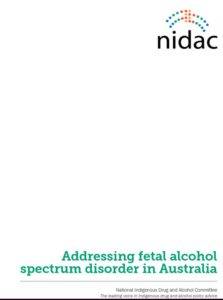
Addressing fetal alcohol spectrum disorders in Australia
National Reports & FrameworksThis paper gives an overview of FASD as well as a summary of its impacts in Australia. Finally it gives recommendations on dealing/preventing it.
Download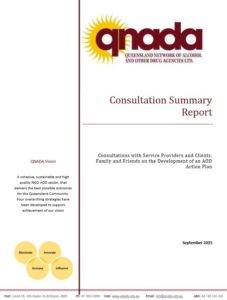
QNADA – Consultation Summary Report: Consultations with Service Providers and Clients, Family and Friends on the Development of an AOD Action Plan
QNADA ReportsThe Queensland Mental Health Commission (QMHC) is developing an Action Plan that will outline actions to be taken by government agencies, non-government organisations and other partners to prevent and reduce the adverse impact of alcohol and drugs on the health and wellbeing of Queenslanders. This work sits under Shared Commitment to Action 3 (priority area actions) of the Queensland Mental Health, Drug and Alcohol Strategic Plan 2014-20191.
View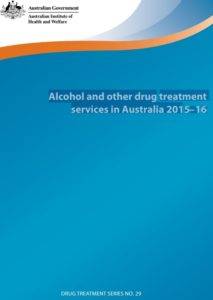
Alcohol and other drug treatment services in Australia 2015–16
National Reports & FrameworksAlcohol and other drug treatment services assist people to address their problematic drug use through a range of treatments. Treatment objectives can include reduction or cessation of drug use as well as improvements to social and personal functioning. Assistance may also be provided to support the family and friends of people using drugs. This document follows and highlights from the Alcohol and Other Drug Treatment Services National Minimum Data Set (AODTS NMDS).
View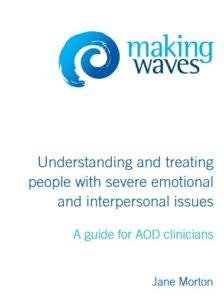
Making Waves – Understanding and treating people with severe emotional and interpersonal issues
ResourcesThis book builds upon two earlier Making Waves booklets, developed by Dr Kate Hall, Dr Tiffany Reichart, Jacqui Cameron and Dr Amy Pennay: » Recognising and managing treatment interfering behaviours: A guide for clinicians » An introduction to managing deliberate self-harm: A guide for AOD clinicians. These booklets can be downloaded from the Turning Point website www.turningpoint.org.au.
View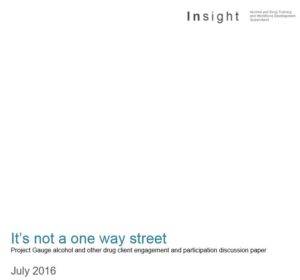
It’s not a one way street: Project Gauge alcohol and other drug client engagement and participation discussion paper
ResourcesThis discussion paper provides an outline of the current research, legislation, frameworks and principles of client engagement and participation (CEP), and more specifically within the alcohol and other drugs (AOD) sector.
View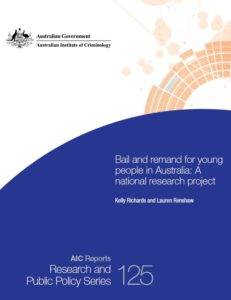
Bail and remand for young people in Australia: A national research project
ResourcesThe custodial remand of young people has recently emerged as a key issue for youth justice in Australia, due primarily to concerns about perceived increases in young people on custodial remand. While a number of research studies and reviews on this topic have recently been published, this report provides the first detailed national consideration of the issue.
View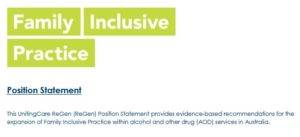
Family Inclusive Practice: Position Statement
ResourcesFamilies affected by an individual’s AOD use can carry a heavy burden. Problematic AOD use can significantly strain relationships, increase social isolation and undermine families’ resilience and physical, emotional and financial security, regardless of their socio-economic status. FIP works with the family as a whole and sees the family unit, as well as individual members, as the unit of intervention (Battams et al, 2010).
View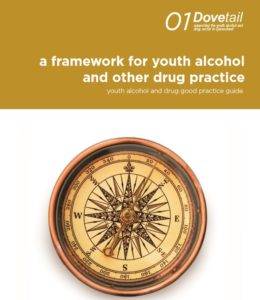
Youth alcohol and drug practice guide 1: A framework for youth alcohol and other drug practice
ResourcesThis Guide outlines a framework for working with young people whose AOD use creates significant cant vulnerability to current or future harm. A clear message from practitioners and research is that in order to respond to a young person’s vulnerability, a broad rather than narrow approach is needed. A broad approach sees various factors and pathways into and out of problematic AOD use by young people.
View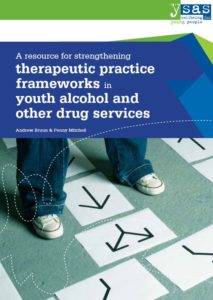
A resource for strengthening therapeutic practice frameworks in youth alcohol and other drug services
ResourcesThis resource has been compiled for the purpose of enabling youth alcohol and other drug (AOD) services to develop and/or strengthen their therapeutic practice frameworks.
ViewAlcohol and other drug withdrawal: Practice guidelines third edition
National Reports & FrameworksThese revised clinical guidelines seek to direct clinical practice by outlining recognised, evidence based treatment interventions. They draw on current literature and clinical practice expertise. These Guidelines provide guidance for clinical decision-making in the context of individual client requirements, withdrawal setting, treatment availability and individual service protocols.
View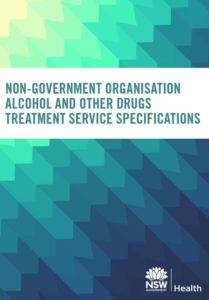
Non-Government Organisation Alcohol and Other Drugs Treatment Service Specifications
ResourcesThese Treatment Service Specifications have been prepared for Non-Government Organisation (NGO) service providers. Yet the NGO alcohol and other drug treatment services are only one component of the NSW treatment service system. People receive alcohol and other drug treatment from multiple agencies and services in NSW, notably government providers (LHDs/LHN), primary care providers (GPs), and through private facilities.
View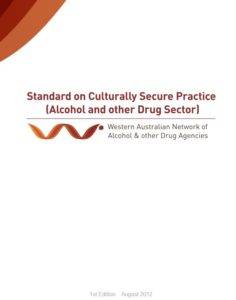
Standard on Culturally Secure Practice (Alcohol and other Drugs Sector)
ResourcesThe Standard is supported by a separate Interpretive Guide that provides examples of the way in which the criteria contained in the Standard might be applied in practice. To achieve certification against the Standard, agencies will need to meet 80% of criteria labelled as ‘essential’ under each Performance Expectation, which represent the minimum level of activity required to demonstrate cultural security in agency practice.
View